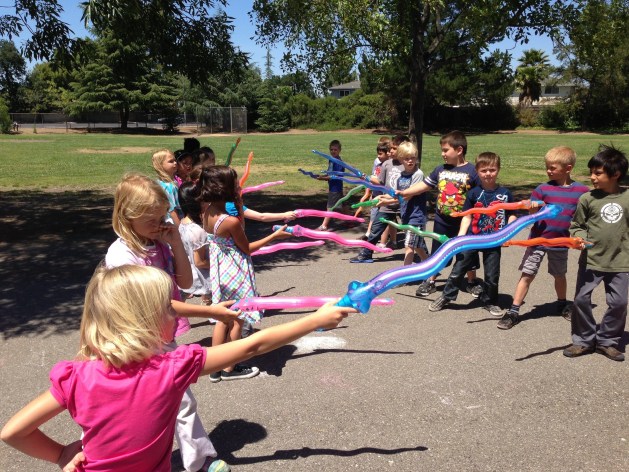
Most kids start sports somewhere like tiny soccer leagues or toddler gymnastics classes, but most of them start learning to work with teammates and play right on the playground. They naturally transition from one activity to another, but all too often we see kids and parents get stuck in the idea that one sport is the be-all-end-all, and not in a positive way.
Let’s talk through a scenario:
Your recently turned eleven-year-old child has been really into soccer for the last four years. They love the team aspect and the physicality of it, but they’ve started to get bored with running back and forth across the pitch. Yes, it’s exciting sometimes, but they aren’t challenged anymore with the sport. They like it, and they have a ton of friends in it, but it’s just not the same as it was before.
This past season was quite a slog towards the end, and you tried to encourage them to stick with it, but their interest just wasn’t in it anymore.
Now it’s time to start signing up again for the next season of soccer, and you’re stuck – your child loved this sport for so long, but you can tell by their demeanor that they aren’t going to sign up for soccer for themselves, but rather because of lots of other pressures from teammates and their coach. Their sibling or friend has been doing fencing for a long time and you want your child to try it out because you think it’ll be a good fit for them.
How can you transition them from this sport that they used to love into something that will ignite their fire? How do you transition them from being in something that they no longer are passionate about into something else that will help them reach their full potential?
Transitioning a child from another sport to fencing can be an exciting, intimidating, but delicate process. Here are some ideas for the parent in this situation, and maybe they’ll help you work out how to help your child with their own transition.
1. Communicate with your child
Before making any decisions, talk to your child about their interests and feelings regarding the potential transition. This might take some time. You might need to be gentle, but you do want to be direct.
Understand that kids themselves need time to sort out their feelings. They won’t necessarily know exactly what they want, and kids often go back and forth about where their interests are. This is why communication can be frustrating for parents, but it’s also why it’s so very important for us to engage. They will change their mind, but if we know that’s coming because we’ve been keeping tabs along the way, giving them the space to communicate, then we can better help them pivot and cope with their own emotions.
Talk to your child about why they want to switch sports to explore fencing. What do they hope to gain? What will they lose? Not only are you here to listen, but to help them see all of the sides of the situation. The decision should ultimately be theirs about what activities they choose to participate in, but in the midst of that, they need to feel your support communicated through both listening and asking questions.
2. Research fencing together
A change like this can become a moment of bonding for you and your child. If you’re not familiar with fencing, you two can learn about it together. This means heading over to Youtube to find videos about fencing, reading articles online, and going to fencing events to see the sport live and in person.
What does the atmosphere of fencing feel like and how does that gel with your child’s attitude and disposition? Keep in mind that you’re both looking for what the sport is about AND how your child will fit into it. It’s like dating, and this is the part where your child and fencing are getting to know each other.
As you learn, you’ll find out about the requirements, the rules, the level of commitment, and the possibilities for advancement in the sport. Figuring out the expectations for involvement and the culture not only of the wider fencing world, but really of the practice in your area is critical. It might look great on paper or in the media that you see about it, but the specific organizations in your area might not reflect what you’ve researched totally.
Fencing in reality is not what it is in many movies, though the spirit is always there. Every club you run into is going to have its own culture, and you want that to be in line with the ways that are best for your child. Most cities will have limited options for places to train, but do look in neighboring towns to see if there are other options in driving distance.
The important thing here is that this process is a way for you to connect with your child. It’s not just about choosing this sport or that one – it’s about you being there to guide your child to find the things that fulfill them and propel them forward.
3. Try out fencing
Of course you don’t want to totally commit to something before your child has a chance to try it out. The reality of the sport might not be exactly what they envision, and while in our experience kids are usually more interested in pursuing fencing after they’ve tried it out, this isn’t always the case.
Before fully committing, allow your child to participate in a trial or introduction session or attend a few fencing lessons. You can even start off by attending a local tournament for a few rounds to see what that is all about. This hands-on experience will help them gauge their interest and figure out if they enjoy fencing, or if they really just like the idea of it.
Note that fencing clubs will usually let kids use loaner equipment during their introduction phase, so you won’t have to invest in a ton of equipment at the outset. It’s not until after your child has decided that they are committed to pursuing fencing that they will need to get equipment. Along these same lines, understand that your child may not immediately excel in fencing. They didn’t start out in their previous sport at the top of the hill, and they definitely won’t start out in fencing at the top either.
Every sport has a learning curve, and it takes time to adapt to different skills and techniques. Set realistic expectations from the outset, and celebrate the curve of growth.
4. Offer support and encouragement
Making decisions for kids who are unsure of themselves is a big deal. While some kids are naturally confident in their decision-making and are able to feel comfortable in their own choices, that’s not the case for all kids. Meet your child where they are.
No matter the reason for the transition out of one sport and into another, support your child throughout the process. Give them the space they need to express their feelings, and listen attentively when they start talking about it. While they’ll face challenges from the outset, you can always praise their effort.
Your child may have concerns or fears about switching sports, and these can come from many sources. One is that kids can worry about making new friends, experiencing failure, or leaving their old teammates behind. Don’t discount the social aspect of this whole thing. Social life for a child naturally extends to their sports activities. Encourage them to talk about what they’re feeling instead of bottling it up. Assure your child that it’s normal to feel nervous and even to second guess decisions, but new opportunities can lead to positive growth.
5. Give them honest decision making power
Though it’s very tempting to pull kids this way and that way when they have big decisions to make, it’s important for their development that they have ownership of what they’re doing in their extracurricular activities. By empowering kids to make their own decisions, we’re showing them that we’re confident they’ll do the right thing. The minute we second guess a child’s decision, that’s the minute that their trust in themselves erodes.
If, after trying out fencing after giving up on another sport, your child decides they don’t want to continue, respect their decision. Transitioning to a new sport is not about imposing your desires on them but about helping them explore their interests. They may discover that their initial choice was right for them and that fencing isn’t the way to go.
This is why parents need to pursue trial periods. During this time it’s easy for kids to walk away from any sport that they’re experimenting with and no one feels so invested that it’s a problem.
The hardest part here is if a child has left a sport that they were previously invested in to try something new, such as if they didn’t go to tryouts for their school team because they wanted to go into something new and the new thing doesn’t work out. Oftentimes, parents and kids can both feel a wave of regret at having made the wrong decision. There are several ways to go about this:
- Go for a trial period of fencing either between seasons
- If the timing is too close, go out for the team first and attempt to do both for a while.
- Take the plunge and let go of the sport that isn’t working and trust that even if fencing doesn’t work out, there will still be other opportunities.
Number three is the hard one. Sometimes we have to let things go in order to move in the right direction, and letting go is hard. However, just because a child is naturally talented at a sport, that doesn’t mean it makes them happy.
What you’re teaching kids when you let them have honest decision power is that they can trust themselves, and that even if it doesn’t go the way you all hope it will, it still will be ok. It still can be great, even. It’s ok for kids to make the wrong choices sometimes. That’s how they learn, and it’s how life is.
6. Find a fencing community that works
When a child starts out in a new activity, they need a group of people around them that will support their growth and start them off from wherever they are. Especially if they were involved heavily in another sport that was their passion for some time, they will need to be around people who really “get” the value of fencing.
Transitions can be bumpy. A great coach can assess your child’s abilities, offer personalized training, and give them great insight into their progress from another sport. The coach doesn’t have to be intimately familiar with whatever your child was doing before, but they should be supportive of the skills your child learned there.
While fencing is not a traditional team sport, there are lots of aspects of camaraderie and teamwork that are baked into fencing. Look for a strong group of fencers, but also realize that sometimes fencers might be in classes with college students and adults as well. This dynamic provides mentorship and lots of opportunities for learning.
Transitions are good for kids
Ultimately, the primary goal of participating in any sport should be fun and personal development. The two are inextricably linked. Give your child the chance to explore sports that they are interested in, and focus on the positive aspects of the transition.
The decision to transition from one sport to another should be driven by your child’s interests and passions. As parents and guardians, let’s encourage our children to explore new avenues and expand their horizons.
The piste awaits! Fencing is ready to welcome young athletes into a sport that embraces tradition, skill, and the thrill of the duel. From playgrounds to piste, let’s give our kids the opportunity to embrace the art and sport of fencing and all the benefits it brings to their lives.




I started in seventh grade after my father forbade me continuing American football resultant of seeing me then-legal helmet-tackled.
You wrote “this can become a moment of bonding for you and your child. If you’re not familiar with fencing, you two can learn about it together.” Two World 50s+ champions began with your kids. You can do that too! See you on the strip [and the bar afterwards. 😉 ].